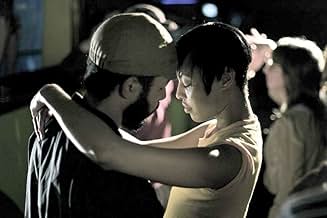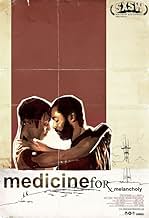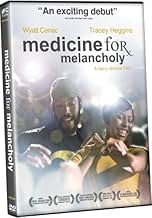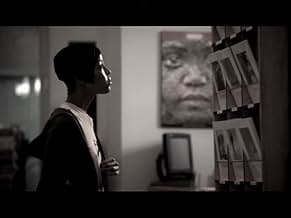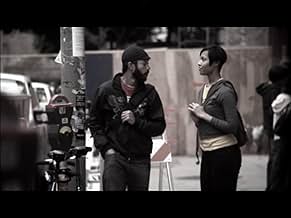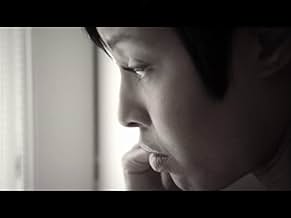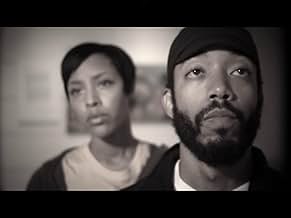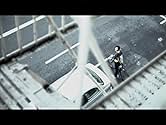AVALIAÇÃO DA IMDb
6,6/10
2,8 mil
SUA AVALIAÇÃO
Adicionar um enredo no seu idiomaTwenty-four hours in the tentative relationship of two young San Franciscans also dealing with the conundrum of being a minority in a rapidly gentrifying city.Twenty-four hours in the tentative relationship of two young San Franciscans also dealing with the conundrum of being a minority in a rapidly gentrifying city.Twenty-four hours in the tentative relationship of two young San Franciscans also dealing with the conundrum of being a minority in a rapidly gentrifying city.
- Prêmios
- 2 vitórias e 10 indicações no total
Melissa Bisagni
- Sierra Orneilias
- (as Melisa Bisagni)
Chida Emeka
- Hydration Hustler 1
- (as Chidi Emeka)
Ondine Kilker
- Ondine Kilcher - Housing Rights Meeting Attendee
- (as Ondine Kilcher)
Avaliações em destaque
Micah (Wyatt Cenac) takes Joanne (Tracey Heggins) to the Museum of the African Diaspora on a Sunday afternoon. They woke up that morning in somebody else's house not knowing each other's names after a one-night stand at a party where they both got very drunk. It's San Francisco. They're black. They ride bikes. She was very unfriendly at first, not just because it was a drunken coupling but because she has a white curator boyfriend she lives with who just happens to be in London for the moment, but she loves him.
The first part of this first film by Barry Jenkins, which is shot in digital video tuned to be almost but not quite totally drained of color (like the city, as we are to learn), with pale grays and very white whites, is sustained by Micah's efforts to make Joanne want to spend some time with him. He thinks they ought to get to know each other, and it's a Sunday. She's not at all interested at first. They're both hung over, after all. She lets him take her home in a taxi and then just gets out and runs. But she leaves her wallet on the floor. To go back and find her it takes a search, on his bike, across town, because the address on her license isn't current. The film is also sustained by being very specifically shot in San Francisco. When Joanne goes to a gallery to run an errand it's a very specific gallery. The Museum of the African Diaspora is the Museum of the African Diaspora. The light is San Francisco light. Micah and Joanne are young urban sophisticates. That, as Micah points out, is not only specific but makes them a small minority of a small minority, because gentrification has shrunk the city's blacks to 7% of the city population (New York's proportion is 28%).
Later buying groceries for dinner at his place (because Micah succeeds and Joanne does spend the day with him, and more) they happen upon a group discussing what appears to be the imminent banishment of rent control in San Francisco. Is Jenkins lecturing us, or just treading water? It doesn't matter so much, because the interactions of Micah and Joanne and the wry, cautious words they use when they talk to each other remain central, and are as specific and accurate to who they are (if not to San Francisco) as the cityscapes and the special light.
These two fine actors and this sensitive filmmaker certainly know how to make it real and to record how unpredictably things change from minute to minute. When Micah takes Joanne to the museum, instead of SFMoMA (her original suggestion), and then to the Martin Luther King Memorial at Yerba Buena Center, maybe it's turning into a pretty cool date. But when he leads her over a little bridge there and says, "This is like LA," she just rather coldly says, "Never been," and then, rubbing it in once more and pulling back, "This is a one-night stand." A ride on the merry-go-round at Yerba Buena, she seems to be saying, isn't going to change anything. This delicate homage to a moment is also a rueful acknowledgment of how hard it is to change the way things are.
And it has to be a bit of a lecture, because Micah is "born and raised," while Joanne is a "transplant," and he wants to remind her how the Fillmore and the Lower Haight were wiped out in the Sixties in "Urban Redevelopment:" goodbye black people, goodbye white artists. Micah lives in an immaculate little apartment in the Tenderloin. Micah, as the voice of Barry Jenkins, wants to reclaim San Francisco for everyday people.
Actually, Micah and Joanne seem like a perfect couple. Maybe that's why they can't be together, except just for this one day? You want to just shout out to them, "Can't you just be friends?" They fit so well together. Is this 'Medicine for Melancholy' or just 'melancholy'? Maybe it's medicine 'and' melancholy. That must be it. A fine little lyric of people and a place. And wholly without cliché except maybe for the tagline: "A night they barely remember becomes a day they'll never forget. "
Seen at the San Francisco International Film Festival 2008. This had its debut at SXSW, the South by Southwest Interactive event in Austin, Texas. 'Medicine for Melancholy' tied for the Audience Award for Best Narrative Feature in San Francisco with Rodrigo Pla's 'La Zona.'
The first part of this first film by Barry Jenkins, which is shot in digital video tuned to be almost but not quite totally drained of color (like the city, as we are to learn), with pale grays and very white whites, is sustained by Micah's efforts to make Joanne want to spend some time with him. He thinks they ought to get to know each other, and it's a Sunday. She's not at all interested at first. They're both hung over, after all. She lets him take her home in a taxi and then just gets out and runs. But she leaves her wallet on the floor. To go back and find her it takes a search, on his bike, across town, because the address on her license isn't current. The film is also sustained by being very specifically shot in San Francisco. When Joanne goes to a gallery to run an errand it's a very specific gallery. The Museum of the African Diaspora is the Museum of the African Diaspora. The light is San Francisco light. Micah and Joanne are young urban sophisticates. That, as Micah points out, is not only specific but makes them a small minority of a small minority, because gentrification has shrunk the city's blacks to 7% of the city population (New York's proportion is 28%).
Later buying groceries for dinner at his place (because Micah succeeds and Joanne does spend the day with him, and more) they happen upon a group discussing what appears to be the imminent banishment of rent control in San Francisco. Is Jenkins lecturing us, or just treading water? It doesn't matter so much, because the interactions of Micah and Joanne and the wry, cautious words they use when they talk to each other remain central, and are as specific and accurate to who they are (if not to San Francisco) as the cityscapes and the special light.
These two fine actors and this sensitive filmmaker certainly know how to make it real and to record how unpredictably things change from minute to minute. When Micah takes Joanne to the museum, instead of SFMoMA (her original suggestion), and then to the Martin Luther King Memorial at Yerba Buena Center, maybe it's turning into a pretty cool date. But when he leads her over a little bridge there and says, "This is like LA," she just rather coldly says, "Never been," and then, rubbing it in once more and pulling back, "This is a one-night stand." A ride on the merry-go-round at Yerba Buena, she seems to be saying, isn't going to change anything. This delicate homage to a moment is also a rueful acknowledgment of how hard it is to change the way things are.
And it has to be a bit of a lecture, because Micah is "born and raised," while Joanne is a "transplant," and he wants to remind her how the Fillmore and the Lower Haight were wiped out in the Sixties in "Urban Redevelopment:" goodbye black people, goodbye white artists. Micah lives in an immaculate little apartment in the Tenderloin. Micah, as the voice of Barry Jenkins, wants to reclaim San Francisco for everyday people.
Actually, Micah and Joanne seem like a perfect couple. Maybe that's why they can't be together, except just for this one day? You want to just shout out to them, "Can't you just be friends?" They fit so well together. Is this 'Medicine for Melancholy' or just 'melancholy'? Maybe it's medicine 'and' melancholy. That must be it. A fine little lyric of people and a place. And wholly without cliché except maybe for the tagline: "A night they barely remember becomes a day they'll never forget. "
Seen at the San Francisco International Film Festival 2008. This had its debut at SXSW, the South by Southwest Interactive event in Austin, Texas. 'Medicine for Melancholy' tied for the Audience Award for Best Narrative Feature in San Francisco with Rodrigo Pla's 'La Zona.'
Twenty-four hours in the tentative relationship of two young San Franciscans also dealing with the conundrum of being a minority in a rapidly gentrifying city.
Barry Jenkins has described the film's two main characters as "playing out a debate back and forth about identity politics". Each of the two main characters embodies an ideology. Jenkins saw the character of Micah as a man who was always building barriers, whereas Jo thinks that race is a limiter. Accusing Jo of assimilation, Micah strives to reclaim his essential "blackness" as Jo contrastingly claims Micah has a "hang up" about his race and strives to overcome her own.
Roger Ebert gave the film 3.5 out of 4 stars, calling the actors "effortlessly engaging" and the direction "assured"; he also noted the film was "beautifully photographed". Ebert is right on all counts. The acting is superb, very natural, and really shows off Wyatt Cenac as more than a comedian. The direction is strong, and the cinematography is gorgeous, some of the best you will find anywhere, whether in a big budget film or indie.
The discussion of race is great. As a white man, maybe I can't see the issue from the point of view of Micah, Jo or Barry Jenkins. But I love that there's this divide of ideas. Micah is indignant, as he should be, about being a minority. But Jo prefers to look forward. Indeed, how does one define themselves? I don't think of myself as "white", and sometimes not even as a "man", but do these things define me whether or not I choose to accept them?
Barry Jenkins has described the film's two main characters as "playing out a debate back and forth about identity politics". Each of the two main characters embodies an ideology. Jenkins saw the character of Micah as a man who was always building barriers, whereas Jo thinks that race is a limiter. Accusing Jo of assimilation, Micah strives to reclaim his essential "blackness" as Jo contrastingly claims Micah has a "hang up" about his race and strives to overcome her own.
Roger Ebert gave the film 3.5 out of 4 stars, calling the actors "effortlessly engaging" and the direction "assured"; he also noted the film was "beautifully photographed". Ebert is right on all counts. The acting is superb, very natural, and really shows off Wyatt Cenac as more than a comedian. The direction is strong, and the cinematography is gorgeous, some of the best you will find anywhere, whether in a big budget film or indie.
The discussion of race is great. As a white man, maybe I can't see the issue from the point of view of Micah, Jo or Barry Jenkins. But I love that there's this divide of ideas. Micah is indignant, as he should be, about being a minority. But Jo prefers to look forward. Indeed, how does one define themselves? I don't think of myself as "white", and sometimes not even as a "man", but do these things define me whether or not I choose to accept them?
Barry Jenkins' (Moonlight/If Beale Street Could Talk) first film from 2008. After a nightly hookup, two lovers, Wyatt Cenac & Tracey Heggins, wake the next morning & share some awkward air together which results in some small talk, toothbrushing w/fingers & a shared breakfast & a ride home. Heggins forgets her purse in the taxi causing Cenac to take his bike towards where she got off & going from house to house he finds her where they make some more small talk & then finally decide to spend the day together while bike riding & visiting the sights of the city. Jenkins gets to the heart of those relationships which start in such a cringe manner but the pointed conversations & silences soon win the audience over to stick around to see how this union will play out w/nice low key perfs from the leads & the city of San Francisco itself which gets it due as the perfect backdrop for this love affair in utero.
10matty03
I wasn't sure what to expect when I sat down to view this film. I knew it had been filmed here in San Francisco and had won some praise. And, I knew it was low-budget/indie.
However, nothing prepared me for the beauty and quiet power of this film. Aside from the painfully beautiful and realistic performances of the two actors and the story of a stretched out one night stand is something that more than a few of us can relate to/with --- what really makes this film stand out for me is the artistic use of editing and cinematography.
The director has created a sharp and tightly made film. Not in color and not in black and white -- the film really sparkles by use of some form of muted visual effect that works on multiple levels considering the story, emotions, actions and lives of the two characters. The editing is perfect -- creating a pace which is both natural and urgent all at once.
I found this film to be close to perfect and elegant.
I suspect we will see a number of indie filmmakers attempt to copy the style of this film.
How refreshing to see a truly original film which never falls back on cliché or indie film tricks.
I also found the use of San Francisco to be quite clever. The city acts as not only a sort of symbol for various aspects of the characters and their relationship but almost as a third character hovering in every single scene.
This is movie not to be missed!
However, nothing prepared me for the beauty and quiet power of this film. Aside from the painfully beautiful and realistic performances of the two actors and the story of a stretched out one night stand is something that more than a few of us can relate to/with --- what really makes this film stand out for me is the artistic use of editing and cinematography.
The director has created a sharp and tightly made film. Not in color and not in black and white -- the film really sparkles by use of some form of muted visual effect that works on multiple levels considering the story, emotions, actions and lives of the two characters. The editing is perfect -- creating a pace which is both natural and urgent all at once.
I found this film to be close to perfect and elegant.
I suspect we will see a number of indie filmmakers attempt to copy the style of this film.
How refreshing to see a truly original film which never falls back on cliché or indie film tricks.
I also found the use of San Francisco to be quite clever. The city acts as not only a sort of symbol for various aspects of the characters and their relationship but almost as a third character hovering in every single scene.
This is movie not to be missed!
Micah and Jo' wake up next to one another after an one-night-stand at a drunken party. Slipping away they awkwardly go their separate ways, but Micah sees her later to return her wallet. They spend the remainder of that day together, biking and walking around San Francisco and chatting generally as they go. This is about the size of the plot and those looking for more of a definite narrative should probably be warned that this is very much a niche indie film that will appeal chiefly to those that like the film almost before they have seen it. I'm not sure if I fall into that category as an older casual viewer but then I did make a certain amount of effort to get hold of the film so I suppose I did have a vested interest to like it. And mostly I did like it: mostly.
The low-key indie feel of the whole film will feel pretentious to some I'm sure but for me it had a certain lo-fi charm that came from the project as a whole. Although the path of the two characters didn't really strike me as realistic or convincing, the charm with which it was delivered helped me to put this out of my mind for the most part. This allowed me to hang out with them as they bumble around the city together in a way that will be recognisable to anyone who has done the same in any major city. In this regard I really liked the film and I enjoyed the "coolness" of it and I didn't care too much that "nothing was happening" in a traditional sense.
This makes for a very slight film and it needed to have a conclusion that fits that – which it sort of does, the problem is more what it includes in the final third. We suddenly have discussions over race that feel clunky compared to the majority of the scenes that had gone before; this made it a little grating and didn't fit with the rest of the film. Of course this does fit well when compared to the sudden introducing of a meeting of random people discussing gentrification in San Francisco, this doesn't fit at all and indeed this sudden introduction of social commentary just clunks onto the screen without any real context or relevance, giving the impression that the film wants to have this aspect but wasn't able or willing to make it part of the whole film, but rather just one scene.
The charm of it is key though and the casting was very important in making this work. Finding Wyatt Cenac in the lead was a surprise and perhaps a bit of a worry since I generally find him to be the least able of those on the Daily Show; I like him but his performances on that show are never as good as John Olivier, Larry Wilmore or some of the stronger ones. Here though he is awkwardly charming in a weird geeky way. He does walk a fine line because at times he could have been irritating but he keeps it on the right side of the line. He is helped a lot by his chemistry with Heggins. She is wonderfully awkward and cute; OK she never got her character's motivations through to me but I still really took to her and to both of them together.
Medicine for Melancholy is a very slight film though and it is not something to come to with high expectations. Rather the indie design and delivery is something that charms those that left it, thanks to the work by maker Jenkins and also the chemistry of the lead two. The attempts to have some form of commentary or meaning in it really clunk towards the end but ultimately, while not great, it is a lo-fi indie pleasure.
The low-key indie feel of the whole film will feel pretentious to some I'm sure but for me it had a certain lo-fi charm that came from the project as a whole. Although the path of the two characters didn't really strike me as realistic or convincing, the charm with which it was delivered helped me to put this out of my mind for the most part. This allowed me to hang out with them as they bumble around the city together in a way that will be recognisable to anyone who has done the same in any major city. In this regard I really liked the film and I enjoyed the "coolness" of it and I didn't care too much that "nothing was happening" in a traditional sense.
This makes for a very slight film and it needed to have a conclusion that fits that – which it sort of does, the problem is more what it includes in the final third. We suddenly have discussions over race that feel clunky compared to the majority of the scenes that had gone before; this made it a little grating and didn't fit with the rest of the film. Of course this does fit well when compared to the sudden introducing of a meeting of random people discussing gentrification in San Francisco, this doesn't fit at all and indeed this sudden introduction of social commentary just clunks onto the screen without any real context or relevance, giving the impression that the film wants to have this aspect but wasn't able or willing to make it part of the whole film, but rather just one scene.
The charm of it is key though and the casting was very important in making this work. Finding Wyatt Cenac in the lead was a surprise and perhaps a bit of a worry since I generally find him to be the least able of those on the Daily Show; I like him but his performances on that show are never as good as John Olivier, Larry Wilmore or some of the stronger ones. Here though he is awkwardly charming in a weird geeky way. He does walk a fine line because at times he could have been irritating but he keeps it on the right side of the line. He is helped a lot by his chemistry with Heggins. She is wonderfully awkward and cute; OK she never got her character's motivations through to me but I still really took to her and to both of them together.
Medicine for Melancholy is a very slight film though and it is not something to come to with high expectations. Rather the indie design and delivery is something that charms those that left it, thanks to the work by maker Jenkins and also the chemistry of the lead two. The attempts to have some form of commentary or meaning in it really clunk towards the end but ultimately, while not great, it is a lo-fi indie pleasure.
Você sabia?
- CuriosidadesMade on a budget of $13,000.
- Cenas durante ou pós-créditosEach song in the soundtrack appears in the credits with a still frame from the part of the movie where it was used.
Principais escolhas
Faça login para avaliar e ver a lista de recomendações personalizadas
- How long is Medicine for Melancholy?Fornecido pela Alexa
Detalhes
- Data de lançamento
- País de origem
- Central de atendimento oficial
- Idioma
- Também conhecido como
- Remedio para melancólicos
- Locações de filme
- Empresas de produção
- Consulte mais créditos da empresa na IMDbPro
Bilheteria
- Orçamento
- US$ 13.000 (estimativa)
- Faturamento bruto nos EUA e Canadá
- US$ 111.551
- Fim de semana de estreia nos EUA e Canadá
- US$ 12.625
- 1 de fev. de 2009
- Faturamento bruto mundial
- US$ 111.551
- Tempo de duração
- 1 h 28 min(88 min)
- Cor
- Proporção
- 1.78 : 1
Contribua para esta página
Sugerir uma alteração ou adicionar conteúdo ausente





